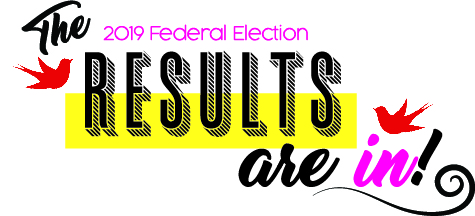Elizabeth May re-elected, as NDP and Green gain votes on Vancouver Island

After 40 days of campaigns, controversy, and clashing candidates, Canada finally has a new government.
The Liberal Party has won re-election, but were knocked down to a minority government with 155 seats in the House of Commons. Justin Trudeau, however, will continue to govern as the Prime Minister of Canada.
At dissolution, the Liberals held 177 seats and needed 170 to hold onto their majority government from 2015. The Conservatives ended up winning the popular vote with 34.5 per cent, slightly higher than the Liberals’ 32.9 per cent vote share.
In the end, as many polls predicted, the race was tight. The Conservative Party will remain the official opposition by winning 122 seats, the Bloc Quebecois rebounded in Quebec by taking 32 seats to finish third, the NDP secured 25 seats, and the Green Party won three seats aided by a breakthrough in New Brunswick.
Here on the island, Laurel Collins secured a victory for the NDP in Victoria with 36 per cent of the vote. For the riding of Saanich-Gulf Islands, Elizabeth May was re-elected by 48 per cent of voters. Esquimalt-Saanich-Sooke saw 35 per cent of the vote carry incumbent candidate Randal Garrison back into office for the NDP. Paul Manly won 35 per cent of the vote for the Greens in Nanaimo-Ladysmith, earning them third seat in the House of Commons.
As of 10:00 p.m. PST, out of the 27 126 166 eligible voters, 16,157,239 people turned up at the polls across Canada to cast their vote. A record-breaking 4.7 million voters came out to advance polling in the weeks leading up to Oct. 21, according to Elections Canada — a 29 per cent increase from voters who cast advance ballots in 2015.
On Sep. 12, Conservatives were polling at the front of the pack with 34 per cent, with the Liberals following close behind at 33.7 per cent. The NDP and Green Party were fairly close, with 12.6 per cent of voters favoring the NDP and 10.8 per cent for the Greens. Meanwhile, the Bloc Québécois and People’s Party trailed at the back of the pack, polling at 4.4 and 3.2 per cent respectively.
It’s been a contentious race, with each of the parties experiencing their share of scandals over the last six weeks.
Within the first month of the campaign, multiple photos and videos of Trudeau wearing black- and brownface were brought to light, along with allegations that Conservative Leader Andrew Scheer falsely claimed to be an insurance broker in Saskatchewan and held dual Canadian-U.S. citizenship. Also, over the weekend, a report from the Globe and Mail discovered the Conservatives hired a firm to discredit the People’s Party.
Meanwhile, Canada’s other major parties weren’t exempt from controversy. Green Leader Elizabeth May accused the NDP of a misinformation campaign against the Green Party on Vancouver Island, while NDP Leader Jagmeet Singh joked that he ‘doesn’t respect Conservatives.’ The Green’s also attracted international attention after doctoring a photo that turned Elizabeth May’s single use paper cup into a Green-branded reusable cup, and the People’s Party received criticism after issuing a blanket statement questioning the scientific basis of climate change.
As of 10:00 p.m. PST, out of the 27 126 166 eligible voters, 16,157,239 people turned up at the polls across Canada to cast their vote.
Four years after sweeping all 32 ridings in Atlantic Canada, the Liberals took all but six ridings in 2019. The Bloc-Quebecois made grounds by gaining 22 seats from 2015, and the Greens gained another seat with Jenna Atwin becoming the first Green MP to be elected in the Maritimes region by defeating Liberal incumbent Matt DeCourcey in Fredericton.
Bloc Leader Yves-François Blanchet secured a seat in the House of Commons by winning the Beloeil-Chambly riding, while Ralph Goodale, a key Liberal cabinet minister, was defeated in his riding of Regina-Wascana. People’s Party Leader Maxime Bernier lost in his home riding of Beauce.
Scheer won comfortably in his home riding in Saskatchewan, while Singh won in Burnaby South over Conservative candidate Jay Shin.
In other races across the country, Jody Wilson-Rabould won as an independent in the riding of Vancouver Granville after being kicked out of the Liberal caucus amid the SNC-Lavalin affair. Jane Philpott, the former Liberal health and indigenous services minister who quit the Liberal party to stand in solidarity with Wilson-Raybould, however, was defeated in the riding of Markham-Stouffville.
With no political party winning the 170 seats needed for a majority government, Trudeau, the incumbent Prime Minister, can ask the Governor-General for the first crack at governing. However, without a majority, the Liberals would need cooperation from other parties in the House of Commons to pass legislation.
Before this election, Canada has had 13 minority governments—with the last one coming in 2011, when Conservative Leader Stephen Harper led consecutive minority governments from 2006 to 2008 and 2008 to 2011.







